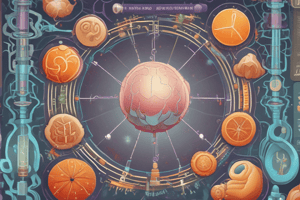Podcast
Questions and Answers
Glycogen metabolism is the process by which the body stores and breaks down ______, a complex carbohydrate stored in the liver and muscles.
Glycogen metabolism is the process by which the body stores and breaks down ______, a complex carbohydrate stored in the liver and muscles.
glycogen
The process of converting glucose into ______ is called glycogenesis.
The process of converting glucose into ______ is called glycogenesis.
glycogen
______ stimulates glycogen synthesis, while glucagon and epinephrine inhibit it.
______ stimulates glycogen synthesis, while glucagon and epinephrine inhibit it.
insulin
The process of breaking down ______ into glucose is called glycogenolysis.
The process of breaking down ______ into glucose is called glycogenolysis.
______ and epinephrine stimulate glycogenolysis, while insulin inhibits it.
______ and epinephrine stimulate glycogenolysis, while insulin inhibits it.
Glycogen serves as a readily available source of ______ for the body.
Glycogen serves as a readily available source of ______ for the body.
______ storage diseases are inherited disorders characterized by defects in glycogen metabolism.
______ storage diseases are inherited disorders characterized by defects in glycogen metabolism.
Impaired glycogen metabolism contributes to the development of type 2 ______.
Impaired glycogen metabolism contributes to the development of type 2 ______.
Optimal glycogen metabolism is important for athletic ______ and endurance.
Optimal glycogen metabolism is important for athletic ______ and endurance.
Flashcards are hidden until you start studying
Study Notes
Glycogen Metabolism Overview
Glycogen metabolism is the process by which the body stores and breaks down glycogen, a complex carbohydrate stored in the liver and muscles.
Glycogen Synthesis
- Glycogenesis: The process of converting glucose into glycogen.
- Key enzymes: Glycogen synthase, glycogen branching enzyme, and glycogenin.
- Regulation: Insulin stimulates glycogen synthesis, while glucagon and epinephrine inhibit it.
Glycogen Breakdown
- Glycogenolysis: The process of breaking down glycogen into glucose.
- Key enzymes: Glycogen phosphorylase, glycogen debranching enzyme, and phosphorylase kinase.
- Regulation: Glucagon and epinephrine stimulate glycogenolysis, while insulin inhibits it.
Importance of Glycogen Metabolism
- Energy storage and release: Glycogen serves as a readily available source of energy for the body.
- Regulation of blood sugar levels: Glycogen metabolism helps to regulate blood glucose levels by storing excess glucose and releasing it when needed.
- Muscle function: Glycogen is an important energy source for muscles during high-intensity exercise.
Clinical Significance
- Glycogen storage diseases: Inherited disorders characterized by defects in glycogen metabolism, such as glycogen storage disease type I (von Gierke disease).
- Diabetes: Impaired glycogen metabolism contributes to the development of type 2 diabetes.
- Exercise performance: Optimal glycogen metabolism is important for athletic performance and endurance.
Glycogen Metabolism Overview
- Glycogen is a complex carbohydrate stored in the liver and muscles, playing a crucial role in the body's energy storage and release.
Glycogen Synthesis
- Glycogenesis is the process of converting glucose into glycogen, involving key enzymes glycogen synthase, glycogen branching enzyme, and glycogenin.
- Insulin stimulates glycogen synthesis, promoting glucose storage.
- Glucagon and epinephrine inhibit glycogen synthesis, favoring glucose release.
Glycogen Breakdown
- Glycogenolysis is the process of breaking down glycogen into glucose, involving key enzymes glycogen phosphorylase, glycogen debranching enzyme, and phosphorylase kinase.
- Glucagon and epinephrine stimulate glycogenolysis, releasing glucose into the bloodstream.
- Insulin inhibits glycogenolysis, promoting glucose storage.
Importance of Glycogen Metabolism
- Glycogen serves as a readily available source of energy for the body, particularly during high-intensity exercise.
- Glycogen metabolism helps regulate blood glucose levels by storing excess glucose and releasing it when needed.
- Glycogen is an important energy source for muscles during high-intensity exercise.
Clinical Significance
- Glycogen storage diseases, such as glycogen storage disease type I (von Gierke disease), are inherited disorders characterized by defects in glycogen metabolism.
- Impaired glycogen metabolism contributes to the development of type 2 diabetes.
- Optimal glycogen metabolism is essential for athletic performance and endurance.
Studying That Suits You
Use AI to generate personalized quizzes and flashcards to suit your learning preferences.




